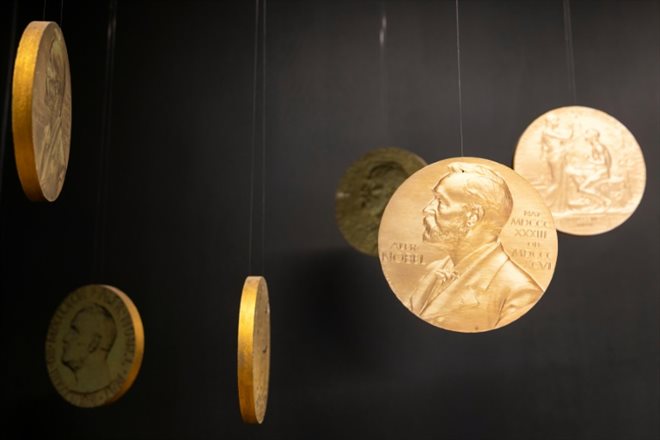Medals bearing the image of the engineer, chemist, inventor and philanthropist Alfred Nobel (1833-1896) (AFP/Archives/Odd ANDERSEN)
The latest Nobel prize, the economics prize closes the season of famous awards on Monday, with specialists in credits, the job market or inequalities expected to be among the possible winners.
The American Claudia Goldin, professor at Harvard and specialist in labor and economic history, is the favorite to obtain the award, announced at 11:45 a.m. (09:45 GMT) in Stockholm.
For the moment, the Nobel Prize in Economics stands out as a parity dunce among the famous awards. Only two women have won it, the American Elinor Ostrom (2009) and the Franco-American Esther Duflo (2019).
“Parity and diversity are a priority and the committee encourages them in appointments,” notes Micael Dahlen, to AFP.
But “the number one priority is to choose the field of research, which then determines the identity of the candidates”, notes this professor at the Stockholm Business School, Handelhögskolan.
Ms. Goldin’s research, which focuses on labor markets and gender equality, is particularly relevant, says the expert.
Last year, the prize went to Ben Bernanke, the former president of the American central bank (Fed) and his compatriots Douglas Diamond and Philip Dybvig, for their work on banks and their necessary rescues during financial storms.
This year, in the guessing game about the nature of the rewarded studies, research on banking systems is almost disqualified.
“The same subject can be rewarded from one year to the next, but it is more common that this is not the case,” summarizes Mikael Carlsson, professor of economics at Uppsala University.
He relies on the work of the Japanese Nobuhiro Kiyotaki and the British John H. Moore.
Their “research which has provided information, among other things, on interest rate cycles and real estate markets, is well placed this year, these are very topical questions”, adds his colleague, Mr. Dahlen.
The Clarivate institute, specialized in predicting scientific Nobels, would see the prize go to Frenchman Thomas Piketty, author of the international bestseller “Capital in the 21st century” and specialist in wealth inequalities.
Often mentioned in recent years, he could be associated with his compatriot Gabriel Zucman and the Franco-American Emmanuel Saez.
The institute, which is based in particular on the number of citations from researchers, also puts forward the names of the Americans Raj Chetty, specialist in the determinants of economic opportunities, and Edward L. Glaeser, for his analysis of the urban economy.
– “False Nobel” –
The Frenchman Philippe Aghion, the Americans George Loewenstein, Kenneth Rogoff and Carmen Reinhart as well as the American-Turkish Daron Acemoglu are also among the academics often considered, the latter with Andrei Shleifer, of Russian origin.
In times of war in Ukraine, “I doubt they would dare”, notes Magnus Henrekson, of the Research Institute of Industry.
The only one not to have been provided for in Alfred Nobel’s will, the economics prize “in memory” of the inventor was added much later to the five traditional prizes, earning him among his detractors the nickname ” fake Nobel.
In 1968, on the occasion of its tercentenary, the central bank of Sweden (Riksbank), the oldest in the world, established an economic sciences prize in memory of Alfred Nobel, by making available to the Nobel Foundation a sum annual equivalent to the amount of the other prizes.
For the winners of the 2023 vintage, the check accompanying the prize is now for eleven million crowns (920,000 euros), the highest nominal value (in Swedish currency) in the more than century-old history of the prize.
The most prestigious Nobel Prize, that of peace, was awarded Friday to imprisoned Iranian activist Narges Mohammadi.
Previously, the Norwegian Jon Fosse had been rewarded in literature. The chemistry prize was awarded to Moungi Bawendi, Louis Brus and Alexei Ekimov for their work on nanoparticles called quantum dots.
In physics, three specialists in the movement of electrons were awarded the prize, Anne L’Huillier, Pierre Agostini and Ferenc Krausz, and in medicine a duo, Katalin Kariko and Drew Weissman, for their progress on the messenger RNA vaccine.
© 2023 AFP
Did you like this article ? Share it with your friends using the buttons below.




